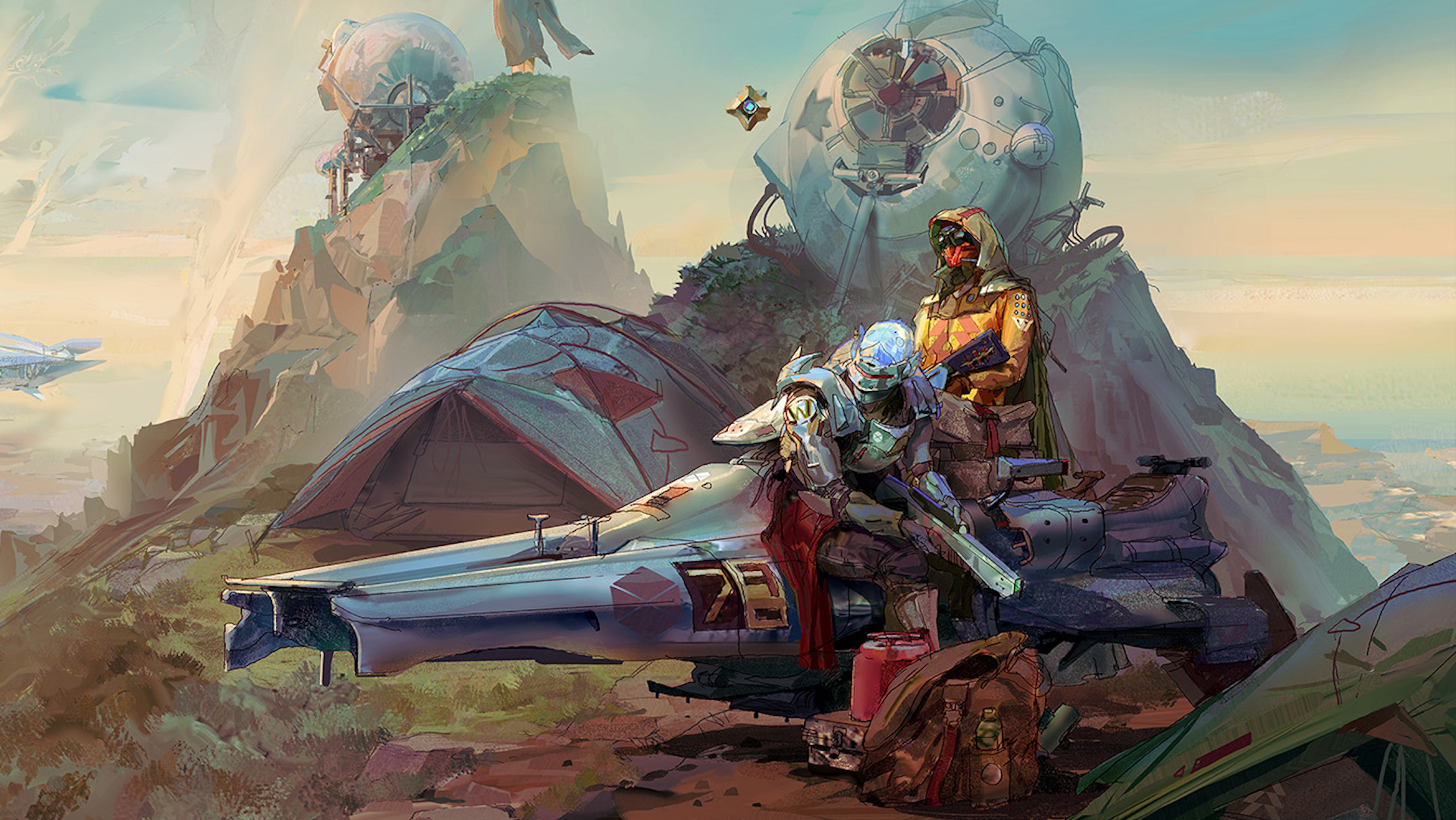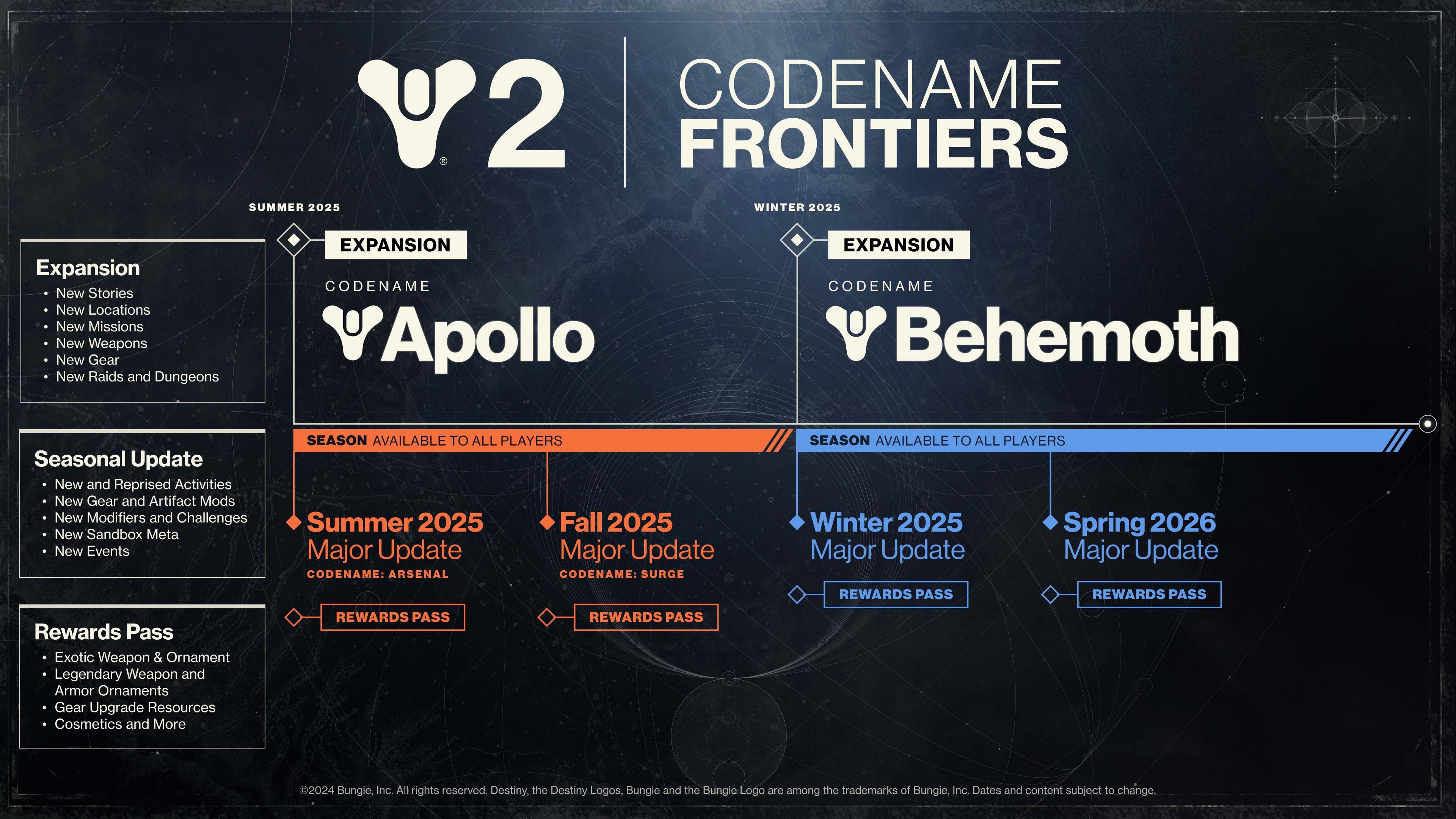Destiny 2 is abandoning big annual expansions and linear campaigns in favour of more frequent releases that are 'mysterious, weird, and not afraid to try new things'
Bungie has offered a first glimpse into its plan for Destiny 2 beyond The Final Shape.

The arrival of the 10th anniversary of Destiny heralds some big changes in the works for Destiny 2, which will drop linear campaigns completely following the end of The Final Shape in favor of two "medium-sized" expansions per year, along with four"major updates" that will be free for all players.
Previous Destiny 2 expansions have been built around major campaigns that push the story forward in big ways—the problem for Bungie being that while those campaigns are very resource-intensive to create, committed players can blow through them in a day or two. Post-Final Shape expansions will forgo that in favor things like "non-linear campaigns, exploration experiences similar to the Dreaming City or Metroidvanias, and even more unusual formats like roguelikes or survival shooters," built around unifying core themes but on a smaller scale.
"Starting next year, instead of one big expansion, we are going to deliver two medium-sized expansions, one every six months," game director Tyson Green wrote. "Each of these will depart from the one-shot campaign structure we’ve been using essentially unchanged since Shadowkeep, and each will be an opportunity to explore exciting new formats instead."
It's a major structural change, but Green said Bungie's commitment to "great storytelling" will remain intact. "Going forward, we want to return the mystery and wonder that was woven into the fabric of early Destiny, when the story felt ripe with possibilities and an epic sense of exploration and discovery."
The episodic structure that replaced Destiny 2's seasonal model last year is also being scrapped in favor of four free "Major Updates" that will occur, well, seasonally: Each expansion will kick off alongside a Major Update, followed by a second three months later; Major Updates will include new and updated activities, rewards, and weekly events, plus the usual array of fixed and balance updates.
"Each update will be a substantial refresh of the core game, bringing new activities and reward content," Green said. "We are also excited to announce that, like Destiny 2: Into the Light, these updates and their content will be free to all players." That's a potentially significant change too: Currently, Destiny 2 episodes, which the Major Updates are replacing, are not free.
The first of Destiny 2's bi-annual expansions, currently codenamed Apollo, is set to launch in summer 2025, presumably not long after the conclusion of The Final Shape, and will be a "non-linear character-driven adventure."
The biggest gaming news, reviews and hardware deals
Keep up to date with the most important stories and the best deals, as picked by the PC Gamer team.

It's been clear since long before The Final Shape that Destiny 2's structure needed a massive overhaul to combat player burnout with the seasonal model. I like most of what Bungie has announced today. Great though they were, the game's campaigns clearly hoovered up way too much dev time compared to how quickly players moved on from them. Better to spend that effort on replayable activities like The Coil and Onslaught. The one thing I'm really not sold on is the new customisable approach to difficulty. This has been tried before with Nightfall score cards, and the end result was players wasting time in orbit trying to agree on modifiers. Likewise, it hardly screams of simplifying the game, which Bungie acknowledges is badly needed.
One fun easter egg I spotted in the blogs is that the Titan in the 10th Anniversary post is carrying Ice Breaker, the exotic sniper rifle from Destiny , which was infamous for its respawning ammo. Sure enough, the text also teases the return of the weapon in an upcoming dungeon. Honestly, we're so power crept these days it will probably need a buff to see play. Overall, I'm glad Bungie has started to fill the post-Final Shape void, as that was definitely contributing to player drop-off—but summer 2025 still feels a very long time away, with plenty of time for more crises before then.
"Previously, in stories like The Final Shape, you experienced the story as A to B to C to D in a nice straight line. In Codename: Apollo, our story takes place over dozens of threads you’ll explore and discover. So, when you land on our brand-new location, the story starts at A, and then you can choose if you want to explore C first, or try and get into B, or maybe investigate D," Destiny 2 narrative director Alison Lührs said.
"The more you play and discover, the more the story progresses, so experiencing a certain number of threads opens up the next part of the story. The order in which you explore will be something you choose, but we have built Codename: Apollo in a way the story always makes sense and flows from beginning to middle to end. There’s no time gating, no waiting for the next drop, Codename: Apollo’s story unfolds based on player progression."
Lührs said "teases" of Apollo will be shared through the second and third episodes of The Final Shape. The first episode, Echoes, is currently underway, while episode two, Revenant, is set to go live on October 8.
Some teasing is already taking place—sadly, from a developer who was a victim of the Bungie layoffs:
Y'all are gonna lose your minds when you find out what this is. This is what I was working on right before the layoffs. It's honestly a cool-ass story. https://t.co/zokVY5vwogSeptember 9, 2024
The long-term future of Destiny 2 has been a major talking point in the Destiny community as the afterglow of The Final Shape expansion faded. The end of the game's 10 year-long 'Light and Dark' saga has left a narrative void that has seen a substantial exodus of players taking this as a natural point to leave the series behind. Compounding the problem for Bungie, Destiny 3 is little more than a dream right now, and Marathon—the studio's other big remaining project—is slowly turning into a nightmare. Meanwhile, Bungie has undergone significant layoffs over the past year and is facing growing pressure from Sony to get itself sorted.
"We all still love Destiny. It is a unique and challenging game, both for you and for us. I’ve personally been working on Destiny for 15 years and it still excites me creatively," Green wrote. "But at the same time, we recognize that it has become too rigid. Expansions have started to feel too formulaic and are over too quickly with little replay value. Seasons and Episodes keep getting bigger but can still feel like you are just going through the motions.
"We believe it’s time for Destiny to change and evolve, and that our community wants this game to grow and innovate too. And to do that, we need to start breaking some of the molds."

Bungie faces two obvious challenges here, first and foremost being the difficulties of maintaining a twice-yearly cadence of Destiny 2 updates. Previous Destiny 2 expansions Shadowkeep, Beyond Light, The Witch Queen, and The Final Shape were all delayed, and with the exception of The Final Shape that was when Bungie was working at full strength, which definitely isn't the case now. Reducing future expansions to "medium-sized," which frankly is an entirely meaningless term, might make them sound more manageable, but if the studio has to make two of them in a year instead of one, what's really changed?
The bigger issue, though, is whether this new approach will be enough to satisfy the restless Destiny 2 community. Player counts are at a historic low, and dissatisfaction with Bungie itself is at an all-time high. It's impossible to judge how Apollo will land, but summer 2025 is a long way off, particularly for a game and a studio that are both clearly struggling.

Andy has been gaming on PCs from the very beginning, starting as a youngster with text adventures and primitive action games on a cassette-based TRS80. From there he graduated to the glory days of Sierra Online adventures and Microprose sims, ran a local BBS, learned how to build PCs, and developed a longstanding love of RPGs, immersive sims, and shooters. He began writing videogame news in 2007 for The Escapist and somehow managed to avoid getting fired until 2014, when he joined the storied ranks of PC Gamer. He covers all aspects of the industry, from new game announcements and patch notes to legal disputes, Twitch beefs, esports, and Henry Cavill. Lots of Henry Cavill.

